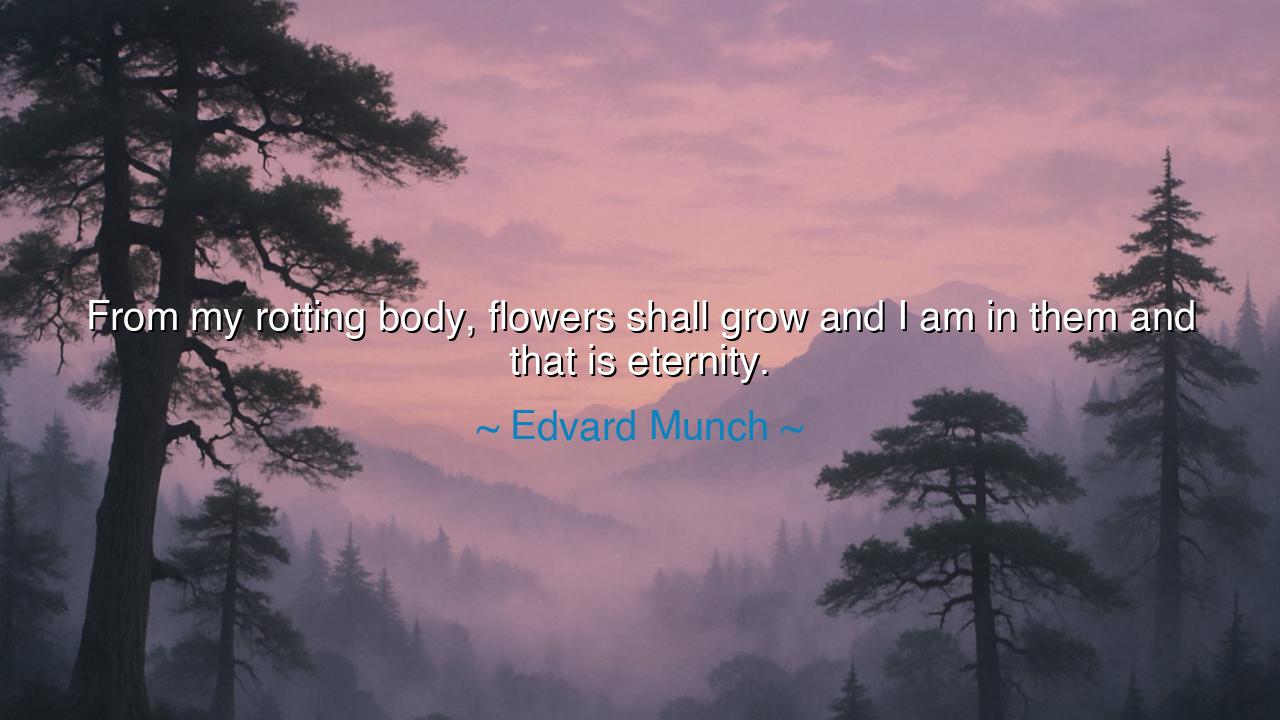
From my rotting body, flowers shall grow and I am in them and






“From my rotting body, flowers shall grow and I am in them and that is eternity.” — Edvard Munch
In these haunting and transcendent words, Edvard Munch, the painter of The Scream, speaks not only of death, but of the sacred continuity of life. His phrase is both macabre and magnificent, for it dares to look directly at the decay of the flesh and see within it the seed of eternity. When he says, “From my rotting body, flowers shall grow,” he reminds us that death is not an ending, but a transformation — the return of what was once conscious and breathing to the great cycle that nourishes all things. The body that fades becomes the earth that blooms. The spirit that departs becomes the whisper in the wind, the color in the petals, the pulse in the soil.
The ancients understood this truth well, though they cloaked it in myth. They spoke of Persephone, the maiden who descended into the underworld each year, only to rise again, bringing with her the spring. Her story was not merely a tale of gods, but of nature’s eternal rhythm — of death giving birth to life, and decay feeding beauty. So too did Munch, the modern seer of sorrow, perceive the same eternal cycle. He saw that what we call rotting is not corruption but renewal; that the grave is not a void, but a womb. In this way, his art and his words become a prayer — a promise that nothing in creation is truly lost.
Munch’s life was shadowed by illness, loss, and solitude. From such darkness, he learned to look upon mortality with eyes unclouded by denial. He saw beauty even in the dissolution of form, and through that vision, he found peace. To him, eternity was not a distant heaven, but the quiet persistence of matter and memory. His body, when it would one day fall, would feed the earth; and in that act, he would live again — not as a man of flesh, but as the fragrance of the wild rose, the blush of a blossom, the breath of spring. In this, Munch joined the lineage of the wise who saw no boundary between the sacred and the natural.
There is a story from the East of a Japanese samurai who, upon his deathbed, wrote his final poem: “The falling blossom returns to the tree — in the thought of spring.” Like Munch, he saw in death not despair, but return — a merging with the whole. These are not the words of resignation, but of awe. They teach that all beings are threads in the great fabric of life, endlessly unraveling and rewoven. The man who understands this fears not decay, for he knows that the self, though perishable, becomes part of something far greater — a cosmic continuity that is beyond the reach of sorrow.
To say, “I am in them,” is to proclaim unity — the dissolving of the boundary between self and nature. The “I” that Munch speaks of is not the narrow ego, but the essence that outlives individuality. He reminds us that immortality is not found in monuments or memory, but in participation with existence itself. We do not need eternity as time without end; we already possess eternity as being without separation. When we die, we do not vanish — we change form. The stars that once birthed our atoms reclaim them; the flowers that bloom from our dust carry our life forward. Thus, even death is sacred.
In these words lies a deeper invitation — to live with reverence for the world that will one day receive us. For if our bodies shall nourish flowers, then let our hearts learn to honor the earth even now. To live mindfully, to care for creation, to walk gently upon the soil that will cradle our bones — this is to prepare for eternity with grace. The cycle that takes us is also the one that sustains us; the same soil that claims the body gives rise to the harvest that feeds the living. Death, therefore, is not defeat — it is belonging.
Lesson:
From Edvard Munch’s meditation on mortality we learn that life and death are not enemies, but partners in the eternal dance of existence. Do not fear decay, for it is the root of renewal. Cherish the earth, for it is both cradle and cathedral. Live not as though eternity lies elsewhere, but as though you are already part of it — because you are. Be kind to the world that will one day bear your memory in the perfume of its flowers. And when your time comes, let your passing be gentle, knowing that you do not end — you become. For from your rotting body, flowers shall grow, and in them, forever, you are.






AAdministratorAdministrator
Welcome, honored guests. Please leave a comment, we will respond soon